- Home
- Meet the head failed by Ofsted on primetime TV
Meet the head failed by Ofsted on primetime TV
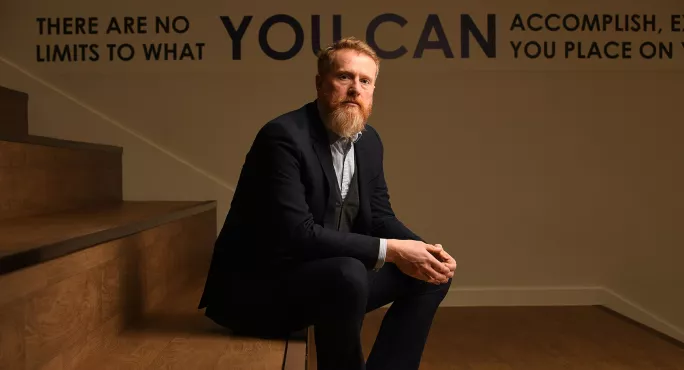
“When we started to make the programme, the story was going to be very much about this school doing quite a good job in quite challenging circumstances financially,” says James Pope.
“But then we were put in special measures, so that changed the narrative.”
It is a rather understated way of describing the two hours of nail-biting, heart-rending tension in the BBC Two documentary School which depicted Pope trying - and failing - to steer a secondary out of the whirling death-spiral of a poor Ofsted, falling pupil numbers and a shrinking budget.
Quick read: Ofsted was ‘brutal’, says head who resigned
Comment: The vicious cycle of a bad judgment shows Ofsted should be scrapped
Quick read: Could TV’s School make a difference to the funding crisis?
At one point, the former headteacher of Marlwood School, in South Gloucestershire, was filmed reading out the local newspaper’s coverage of the report (the headline, glimpsed on his computer screen, stated “Marlwood School thrown into special measures by Ofsted as hundreds of students leave”). “Poor leadership and teaching - there you go,” he says. “Poor leadership.”
The Ofsted report, rating the school “inadequate”, was published in July 2017. Pope resigned a year later. When the TV programme aired in November 2018, he wasn’t watching.
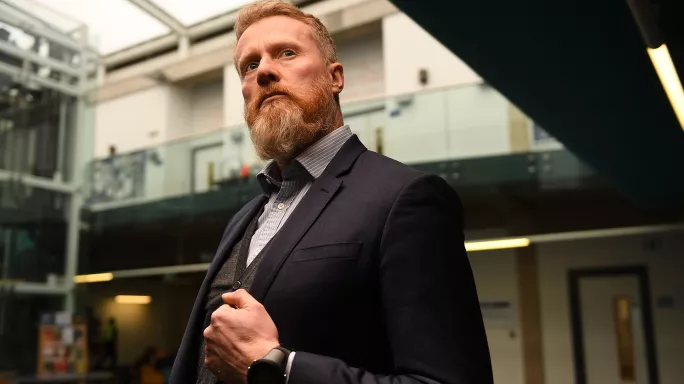
“It was four months after I’d left. Was that a scab I wanted to pick again? Not sure it was,” he says.
That could have been it. The end of the story. And for many heads, it is.
But for Pope, there was another ending.
‘The education community gave me a big hug’
“I was nervous about [the programme being broadcast]. I thought people might say, ‘What an idiot. Why didn’t he do this, this and this? That would have solved all these issues.’ But the reaction was quite the opposite of that. The education community have stepped up and given me a big hug.”
As the programme followed him trying to find £2.8 million in savings over four years, there was an outpouring of sympathy from fellow teachers who watched him become increasingly tired and stressed.
Today, in central London at work as a consultant supporting heads, Pope once again looks relaxed and healthy. He now has a beard
Does he regret doing the programme? Not at all, he says.
He explains that the decision to take part was agreed jointly by the secondary heads and the CEO of the Castle School Education Trust (CSET), which runs Marlwood. There was some trepidation; after all, they knew the show had to be warts and all.
“In reality, we went into it, not naively, but not completely knowing how it would form itself and what it would end up looking like,” Pope says.
As it turned out, his story was one that a lot of those working in schools recognised.
Former head turned wellbeing coach Viv Grant summed up the widespread feeling in a blog for Tes: “Heads have told me that they couldn’t watch all of the episodes of School because viewing made them feel physically sick. The day-to-day struggles faced by teachers, support staff and school leaders mirrored too closely their own.”
For Pope, who saw the edited programmes before they aired, it was “an emotional watch”.
The buzz of teaching
Pope, 46, came late to teaching - he remembers turning up on the first day of his PGCE course at Cheltenham and Gloucester College of Higher Education aged 26 and thinking, “What am I doing here? I don’t want to go back to school. I don’t want to go back to study.”
But then came his first placement, at Cleeve School, near Cheltenham. “As soon as I walked into the classroom and started to engage with these pupils, I was completely hooked. It was a complete surprise to me. But I came away buzzing.”
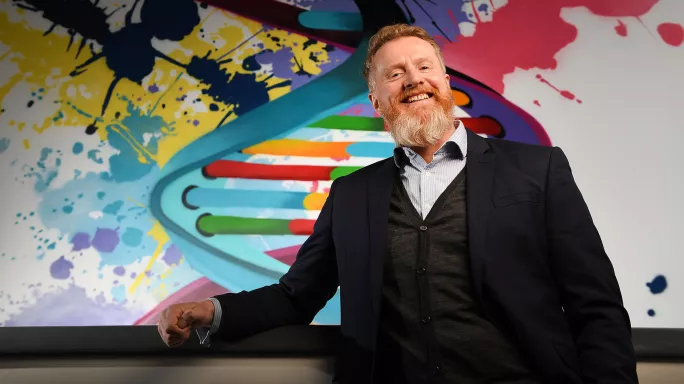
Not that everything went entirely smoothly. When he later brought in a heart, lungs and windpipe from the butcher without first warning the pupils “three girls borderline fainted”. But he not only passed the placement, he got a job. And stayed at Cleeve for the next 11 years.
He was promoted to head of year, and later to head of science. In this role, he was concerned that the teachers seemed to be working harder than the kids. So he decided to tackle low key stage 3 test results by asking teachers to rewrite their schemes of work to focus on deeper understanding. In the first year, the results dipped. “I remember the conversation with the head,” Pope says. “He said, ‘Err, what have you done?’”
But the following year results rose dramatically - he and his team had brought about a step change (“Phew”).
Next, he masterminded a project to revamp the “tatty” science department with very limited funds. He calculated just how much time pupils spent doing practical work (about 20-30 per cent of lessons) and decided there was no need for individual facilities in each classroom. Instead, he built a superlab holding 120 pupils, where they could do all their practical work in one go. The plan was approved and Pope was made assistant head.
An ‘accidental’ school child
He says he wanted his pupils to move from seeing themselves as learning science because they had to pass their GCSE, to understanding that they were working in the way real scientists do. He wanted them to believe not just in their teachers, but in themselves. It is a philosophy that stems from his own schooling.
Pope remembers his parents always being enthusiastic about education, but never really “getting it” himself. He was spent his early years on a council estate in Bromsgrove, then, when he was eight, the family moved to Worcester. At his Catholic state secondary, Blessed Edward Oldcorne, he did what the teachers told him and he did well. His father Richard, who worked as a security guard and paramedic, and mother Angela, who worked at Worcester hospital, were delighted to be told that their son had a chance of going on to be a doctor.
But while his GCSEs went well, he didn’t settle into Worcester Sixth Form College and after failing his A levels in biology, chemistry and maths, fell into various jobs - including bar work at Worcestershire County Cricket Club, where he met stars such as Ian Botham and Graeme Hick.
He enjoyed earning money - but many of his friends had gone to university, and now Pope started to believe he could get there, too.
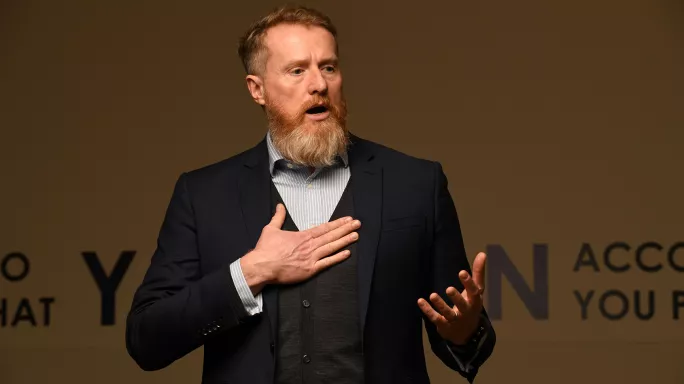
“I describe myself as an ‘accidental school child’,” he says. “Some of those experiences became really important later on. I was passionate about not letting that happen to other young people. I didn’t do badly, but it took me a while to decide what I wanted to do. It became a real passion of mine in teaching, helping young people find their own motivation.”
So he resat his A levels and got into Liverpool John Moores University to take a degree in applied biology - that was the first time he remembers doing something because he wanted to do it.
His degree course included a year out at an orthopaedic hospital near Oswestry, researching arthritis. He remembers raising money for the unit by doing a skydive. It was a friend’s idea.
“I remember going to this old airfield somewhere in Shropshire and getting into this beaten-up old Cessna. In a tandem skydive, the expert is strapped to your back. As their novice, you just hang out the plane, supported by the guy behind you. Then you fall out. It was an incredible experience. I got a video made and used that to teach turbulent velocity for years afterwards”.
Almost 20 years later, Pope had moved on from teaching science to his first headship leading Marlwood school.
He describes the leap from deputy to leader: “You can have all the leadership experience in the world. But there is always that first time when someone asks a difficult question or something goes wrong and you turn around and there is nobody else to do it - it’s you.”
“The first time it really hit home to me was the first open evening for Year 6. I knew getting pupils in the door was an absolutely priority for the future of the school. I remember doing all the prep work but what if nobody turns up?
But people did turn up for the open evening and it was fine.
Over four years, he says, kids, parents and colleagues in the trust thought the school was getting better - but then Ofsted turned up, and said that the improvement wasn’t enough. Things weren’t fine.
Changing the narrative
Pope has had quite a year. Is that why he’s grown the beard? Is he in disguise?
He laughs, he grows a beard every summer. But, for the first time in years, he didn’t need to shave it off in September.
Perhaps it is less, then, about hiding his face and more about embracing a new freedom. A new chapter.
Pope says he is a natural optimist and (still) a headteacher. He has been through the wringer and emerged with his dignity intact - thanks, he says, to the people around him.
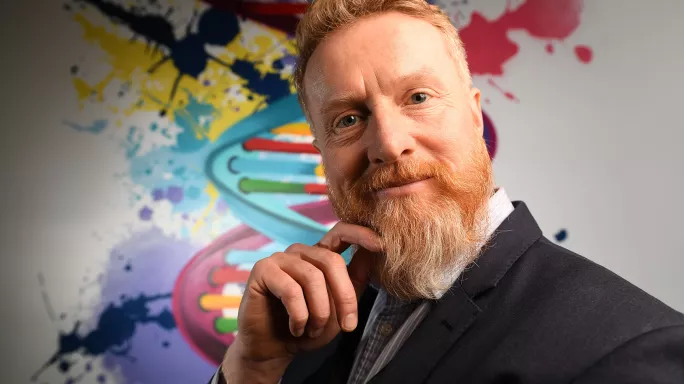
He will always be grateful for the emails from parents at Marlwood, indignant at the Ofsted judgement.
He has been supported by his family (his wife, Kate, is an assistant head herself), friends and colleagues.
And, since the TV programme aired, he has felt “humbled and a bit grateful” to the wider education community.
“You have my support and utmost respect,” tweeted Vic Goddard, co-principal of Passmores Academy in Essex, who appeared on TV in Educating Essex.
But Pope knows that there are other heads who have gone - or who are currently going - through the same intense pressure as he did. Perhaps without the same support.
That’s why although he says he’d be prepared to go back into headship, he wants to make a go of the consultancy he has set up to support school leaders, with the aim of developing a network of like-minded heads who can work to support schools on their own improvement journeys.
He may have been burned. But Pope’s instinct has been not to withdraw - instead he is reaching out. He wants to change the narrative.
CV: James Pope
Education: Blessed Edward Oldcorne RC High School, Worcester Sixth Form College
University: Liverpool John Moores (BSc applied biology) Cheltenham and Gloucester College of Higher Education (PGCE)
1998-2009: Cleeve School, near Cheltenham. Science teacher, promoted to head of year, head of science, assistant headteacher
2009-2014: Chosen Hill School, Gloucestershire. Deputy headteacher
2014-2018: Marlwood School, South Gloucestershire. Headteacher. Executive headteacher of Severn Beach Primary School. Both schools are in the Castle School Educational Trust
2018: InspirEDucate. Director of consultancy offering leadership coaching
Keep reading for just £1 per month
You've reached your limit of free articles this month. Subscribe for £1 per month for three months and get:
- Unlimited access to all Tes magazine content
- Exclusive subscriber-only stories
- Award-winning email newsletters



